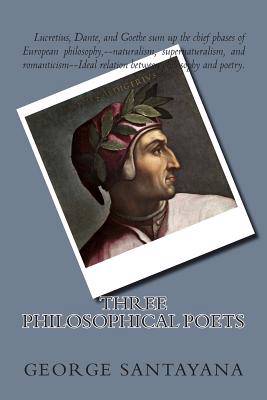
- Afhalen na 1 uur in een winkel met voorraad
- Gratis thuislevering in België vanaf € 30
- Ruim aanbod met 7 miljoen producten
- Afhalen na 1 uur in een winkel met voorraad
- Gratis thuislevering in België vanaf € 30
- Ruim aanbod met 7 miljoen producten
Zoeken
Omschrijving
Three Philosophical Poets is a biography collection by George Santayana that studies the works of the great poets, Lucretius, Dante, and Goethe and sum up the chief phases of European philosophy, --naturalism, supernaturalism, and romanticism--Ideal relation between philosophy and poetry. Titus Lucretius Carus (15 October 99 BC - c. 55 BC) was a Roman poet and philosopher. His only known work is the philosophical poem De rerum natura, a didactic work about the tenets and philosophy of Epicureanism, and which is usually translated into English as On the Nature of Things. Lucretius has been credited with originating the concept of the three-age system which was formalised from 1834 by C. J. Thomsen. Very little is known about Lucretius's life; the only certain fact is that he was either a friend or client of Gaius Memmius, to whom the poem was addressed and dedicated. De rerum natura was a considerable influence on the Augustan poets, particularly Virgil (in his Aeneid and Georgics, and to a lesser extent on the Eclogues) and Horace.[2] The work virtually disappeared during the Middle Ages, but was rediscovered in 1417 in a monastery in Germany by Poggio Bracciolini and it played an important role both in the development of atomism (Lucretius was an important influence on Pierre Gassendi) and the efforts of various figures of the Enlightenment era to construct a new Christian humanism. Virtually nothing is known about the life of Lucretius, and there is insufficient basis for a confident assertion of the date of Lucretius's birth or death in other sources. Another yet briefer note is found in the Chronicon of Donatus's pupil, Jerome. Writing four centuries after Lucretius's death, he enters under the 171st Olympiad: "Titus Lucretius the poet is born."[5] If Jerome is accurate about Lucretius's age (43) when Lucretius died (discussed below), it can then be concluded he was born in 99 or 98 BC.[6][7] Less specific estimates place the birth of Lucretius in the 90s BC and death in the 50s BC, [8][9] in agreement with the poem's many allusions to the tumultuous state of political affairs in Rome and its civil strife. Lucretius was probably a member of the aristocratic gens Lucretia, and his work shows an intimate knowledge of the luxurious lifestyle in Rome. Lucretius' love of the countryside invites speculation that he inhabited family-owned rural estates, as did many wealthy Roman families, and he certainly was expensively educated with a mastery of Latin, Greek, literature, and philosophy
Specificaties
Betrokkenen
- Auteur(s):
- Uitgeverij:
Inhoud
- Aantal bladzijden:
- 116
- Taal:
- Engels
Eigenschappen
- Productcode (EAN):
- 9781507694343
- Verschijningsdatum:
- 24/01/2015
- Uitvoering:
- Paperback
- Formaat:
- Trade paperback (VS)
- Afmetingen:
- 152 mm x 229 mm
- Gewicht:
- 163 g

Alleen bij Standaard Boekhandel
+ 22 punten op je klantenkaart van Standaard Boekhandel
Beoordelingen
We publiceren alleen reviews die voldoen aan de voorwaarden voor reviews. Bekijk onze voorwaarden voor reviews.











